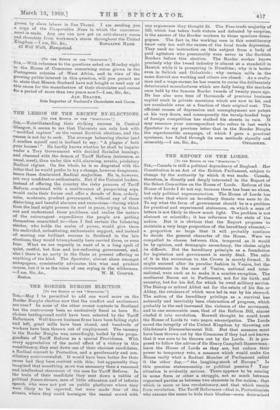THE LESSON OF THE RECENT BY-ELECTIONS.
rTO TRIO EDITOR OP Till "SPEOTATOlt."]
Sin,—Notwithstanding their striking success in Central Glasgow, it seems to me that Unionists can only look with "modified rapture" on the recent Scottish elections, and the reason is not far to seek. The average balancing elector (and confess myself one) is inclined to say: "A plague o' both your houses I" He hardly knows whether be shall be happier under a Tory Government with decided Socialist leanings, and obsessed with the •demon of Tariff Reform (extremes, as usual, meet), than Under this wild, alarming, erratic, predatory Radical regime. On the whole, he is so disgusted with the latter that be would prefer to try a change, however dangerous; hence these diminished Radical majorities. He is, however, not very confident or enthusiastic. But if the Unionist leaders, instead of offering the country the risky panacea of Tariff 'Reform combined with a continuance of pauperising sops, .would unite their forces and offer a decade of firm, orderly, calm, moderate, prudent government, without any of these disturbing and baneful alarums and excursions—during which time the land might possess its soul in peace, trying to think out and understand these problems, and realise the nature of the extravagant expenditure the people are getting themselves committed to—then I feel certain the balancing elector, who holds the scales of power, would give them his undivided, unhesitating, enthusiastic support, and instead of scoring one brilliant success in Scotland in the late elections, they would triumphantly have carried three, or even • four. What we are urgently in want of is a long spell of quiet, restful, but firm and law-enforcing government, and, alas I there is no party in the State at present offering us anything of the kind. The Spectator, almost alone amongst -newspapers, consistently advocates this wise and prudent course, but it is as the voice of one crying in the wilderness.






































 Previous page
Previous page